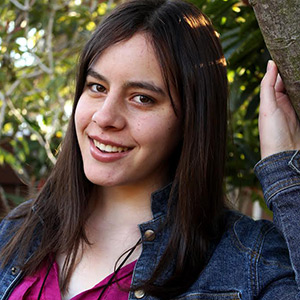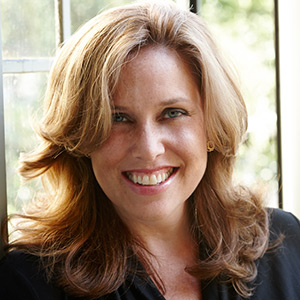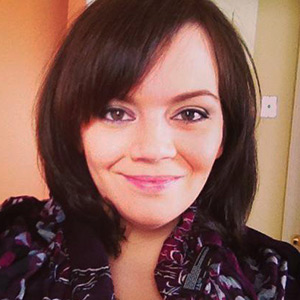If you’re a writer with a dream, get one step closer to becoming a writer with an agent by attending the 31st annual SDSU Writers’ Conference, January 23-25, 2015, in its fabulous new location – the San Diego Marriott Mission Valley.
Among the many info-packed workshops is The Young Adult Debut: Author/Agent/Editor Panel on Saturday, Jan. 24. Learn how the process of discovering an author (or being discovered) happens from the point of view of the author, the representing agent and the acquiring editor.
The presenters are Stephanie Diaz, author and SDSU alumna; Alison Fargis, literary agent with Stonesong; and Eileen Rothschild, associate editor with St. Martin’s Press.

Stephanie Diaz, Debut Author, SDSU Alumna
Q & A with Author Stephanie Diaz
What’s the first book that spoke to you as a young reader?
I used to read the Little House books with my mom, and those were some of my first favorites. I loved the adventure and the wilderness.
How did you get your break?
I found my agent the old fashioned way, by querying. I queried three projects over the course of seven years, (yes, I started super young). There were numerous rejections along the way, but eventually I got a “yes” that turned into offers of representation from four different agents. And in the end, I chose Alison because of her passion for my project and her savvy in the industry.
Did you have a completed book by the time you met your agent?
Yes, I did. Extraction was a complete and revised draft.
Having a platform seems to be a critical ingredient to attracting an agent. Given your youth at the time of your discovery, did you even have a platform or did that become your platform ̶ amazing young writer?
I was active on social media before I had an agent, so I was working on building a platform. But I hardly had anything to boast about. Platform really didn’t seem a big criteria in snagging an agent, in my experience. The book I’d written was the most important.
Do you have any formal training in writing (beyond the basics that we’ve all had) or is your skill the result of being a prolific reader?
I studied film production in college (at SDSU!) and was able to take a couple screenwriting classes with wonderful professors, which taught me many useful skills for storytelling. But I would credit most of what I’ve learned about writing to the books I’ve read throughout my life.
Did you meet with a critique group while writing your novel or labor in solitude?
I was never part of a formal in-person critique group. But I’ve formed relationships with a number of other writers through online sites like Agent Query Connect and twitter, some of which developed into awesome critique partnerships. I’m grateful I didn’t have to go through the process alone.
At what point in the process did you get paired with editor Eileen Rothschild?
Extraction was originally acquired by another editor at St. Martin’s Griffin. Eileen came on board shortly before Extraction‘s release and she’s been working with me since then, on the next two books in the trilogy.
How much did Extraction change from the time you acquired an agent?
It was a lot shorter before I had an agent, so in some ways it changed a lot. But the key plot points in the story remained the same. What changed the most were certain aspects of the world, and a lot of the characters also became more fleshed out.
Your second book, Rebellion, is due out in Feb. 2015. Congratulations. Are you knee deep into the third book in the trilogy?
Thank you! And yes, I am indeed. I recently received editorial notes for the third book, so I’m back in the revision zone. The third book will be out September 2015, so by the end of the year the entire trilogy will be published. It’s crazy! But I’m excited to share the rest of Clementine’s story with my readers, and then move onto some new projects.
What advice do you have for aspiring writers?
Read widely, as much as you can. Write about people and places that inspire you and make you want to put words on the page. And don’t let your age stop you from believing you can be successful.

Alison Fargis, Literary Agent, Stonesong
Q & A with Literary Agent Alison Fargis
What was it about Stephanie’s query letter that made you respond?
I’m lucky to work with a collegial and collaborative group at Stonesong. My fellow agent, Emmanuelle Morgen, received Stephanie’s query in April 2012 and was intrigued enough to request the full manuscript, which she shared with our group. Once I read Stephanie’s opening line, “Today I have to prove I deserve to stay alive,” I had to read more, and devoured the manuscript in one sitting. Emmanuelle knew how taken I was with the novel and graciously allowed me to take it on.
Stephanie’s pacing is brilliantly breakneck and the dark and terrifying world she created on Kiel ̶ complete with starvation, crowbar-wielding officials, and toxic acid leaked from the moon ̶ reminded me of the nonfiction book Escape from Camp 14 about a man’s life and escape from a North Korean prison camp. I knew an editor would love this debut as much as I did.
Can you share one of the best and one of the worst opening lines from query letters you’ve received?
One of the best openings to a query I’ve received recently was this: “Sixteen-year-old Lirael Harrison grew up in a French orphanage, hidden in the woods. She came from the parallel planet, Surya, the one that looks exactly like ours but is slowly disappearing. She, along with 32 other children, has been trained to become a sleeper ̶ to kill and replace the humans who look exactly like them. They’re taught to wait – to sleep – until they’re called to fight the war to take over Earth.”
This query came my way in March 2014. It was for a debut novel called THE UNQUIET by Mikaela Everett. I immediately requested the full and, like Stephanie’s manuscript, could not put it down. Other agents were equally excited but I was lucky enough to sign the author. In May I made a two-book deal with Martha Mihalick at Greenwillow. I’m thrilled to say THE UNQUIET is publishing this September. It’s fantastic!
Most terrible opening lines from queries involve rants about how unfair the publishing process is, how much the writer’s children/mom/friends loved reading their manuscript, or how the writer is eager for me to read their wonderful 150,000+ word middle-grade manuscript.
What’s the sequence of events in response to an effective query letter?
We ask writers to paste either the first chapter or the first 10 pages of their manuscript into the body of their query email. If the query and sample piques my interest, I will request the full manuscript right away.
Reading the full manuscript and responding can take either days or weeks depending on my schedule. I also like to get in-house reads on certain manuscripts, so that can add some time.
In-person meetings rarely happen unless the author lives in the New York City area but I always like to have phone call with an author before making an offer of representation.
What does it feel like to discover a unique new talent, and how often does that happen?
Oh, it is the most exhilarating high! A good portion of my business is devoted to nonfiction lifestyle titles so when I take on a new fiction client, I have to be head-over-heels in love with their manuscript.
What’s the best advice you can give to writers who are right now polishing their pitches, query letters and first 10 pages of their manuscripts in preparation for the upcoming SDSU Writers’ Conference?
When polishing your query, remember to give me the hook first (and make it compelling!), the synopsis next, finally your bio and any housekeeping that needs to be added (is it a stand-alone or part of a trilogy?). Try not to stray from this formula.
What do you hope to find at the 31st Annual SDSU Writers’ Conference?
I would love to find some excellent YA historical fiction. A YA novel set during Stalin’s regime in the Soviet Union would really float my boat!

Eileen Rothschild, Editor, St. Martin’s Press
Q & A with Editor Eileen Rothschild
You came on board shortly before Extraction‘s release and have been working with Stephanie ever since. How does the “come aboard” process work?
Usually when an editor leaves a publishing company, a new editor will take over and work on the project with the author. At SMP our editorial director and publisher match up projects with a new editor. This is a carefully thought out process and each project is different but everyone involved wants the end result to be a wonderful and mutually beneficial relationship. That said, our story is a little unique. Before I became an editor I was SMP’s primary young adult marketing manager. As such I would often read and offer notes to editors when they were interested in acquiring a project. When Stephanie’s former editor sent Extraction to me I knew it was special and sent notes as well as spoke up in favor of the series at our editorial acquisitions meeting. I was ecstatic to find that Stephanie and Alison accepted our offer and was prepared to work on the marketing side of things. Pretty soon after that I transitioned roles and left marketing to become an editor. About a year later, Stephanie and the Extraction series needed a new editor and since I was an early cheerleader, our editorial director felt that we would be a perfect match … and I completely agree!
Can you give us a brief glimpse of the editing process?
It really depends on the author, the schedule and of course the book. I work with a lot of romance authors and they tend to release three or four books a year; the turnaround time on these projects is lightning fast. As a general rule I like to receive the manuscript six months before it’s due to our production team (that’s where the magic happens: copy editing, formatting, printing). This usually gives us plenty of time to do a few rounds of editing/revising, with some built-is padding in case life happens.
Do you have an anecdote to share about working with Stephanie?
I love working with debut authors, as an editor and in my former marketing role. It is just a really fun, rewarding and sometimes challenging time in an author’s career and I like being a part of that. Sometimes it can take an author a little while to get adjusted to the process (it is not all glamorous) and Stephanie just got it. Sometimes she was one or two steps ahead of me! She is a real pro at self-promotion and at creating complex and interesting worlds which spoke to both my marketing and editorial sides.
How would you describe an editor’s dream client?
I think being flexible is really important. This is a business of change, and flexibility (whether it’s during the editing process or during another part of the publishing journey) makes everything more pleasant.
What do you love most about your job?
Hands down the people. Book people are so incredibly passionate and interesting. My colleagues, supervisors, authors, bloggers and publishing professionals I follow on social media, make getting up and going to work each morning a joy. How many people can say that J? Even through the twists and turns I love everything that makes up the publishing industry and am so glad I am a part of it.
What’s the best advice you can give to writers who are right now polishing their pitches, query letters and first 10 pages of their manuscripts in preparation for the upcoming SDSU Writers’ Conference?
STOP! Take a deep breath. Go get a cookie (because cookies make everything better) and come back. There is no need to be nervous, remember editors need YOU, we are looking for YOU. Don’t take rejection personally, this is a subjective business. Don’t give up … I know, I know, easier said than done. It took lots of interviews and lots of rejection to get where I am today and if I had given up after the 3rd, 4th, 16th no, I wouldn’t be answering these questions today.




